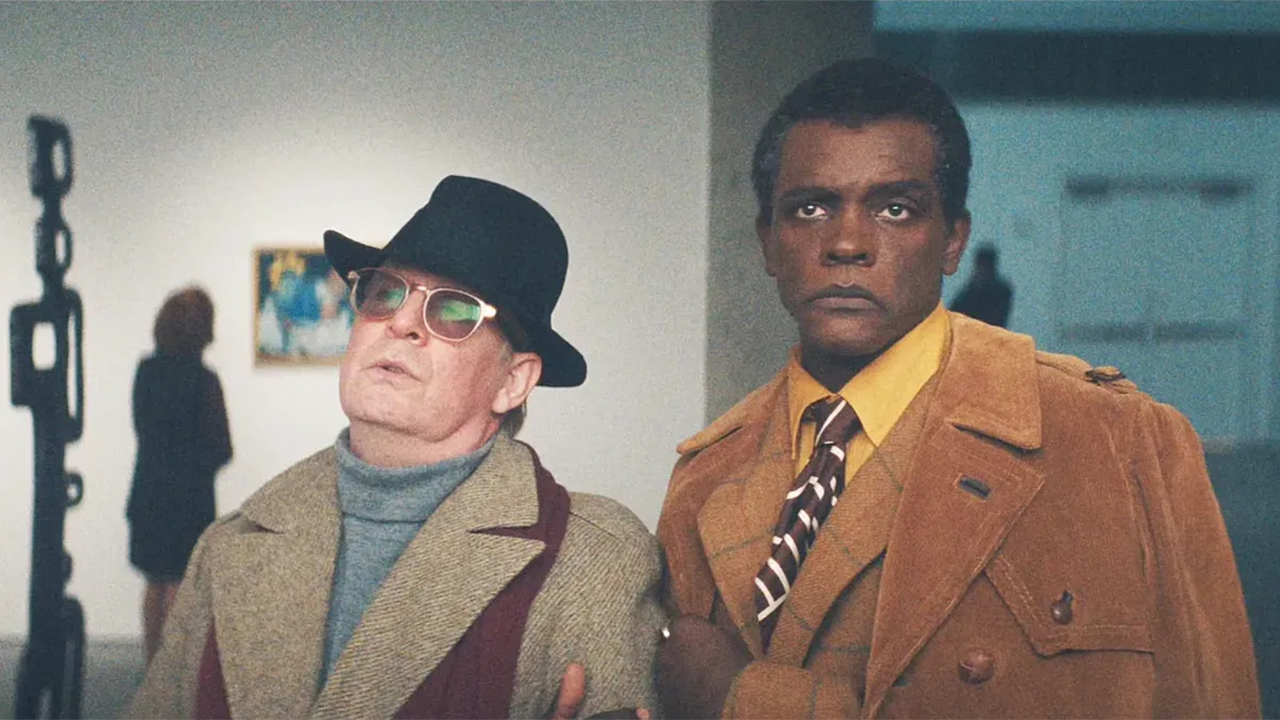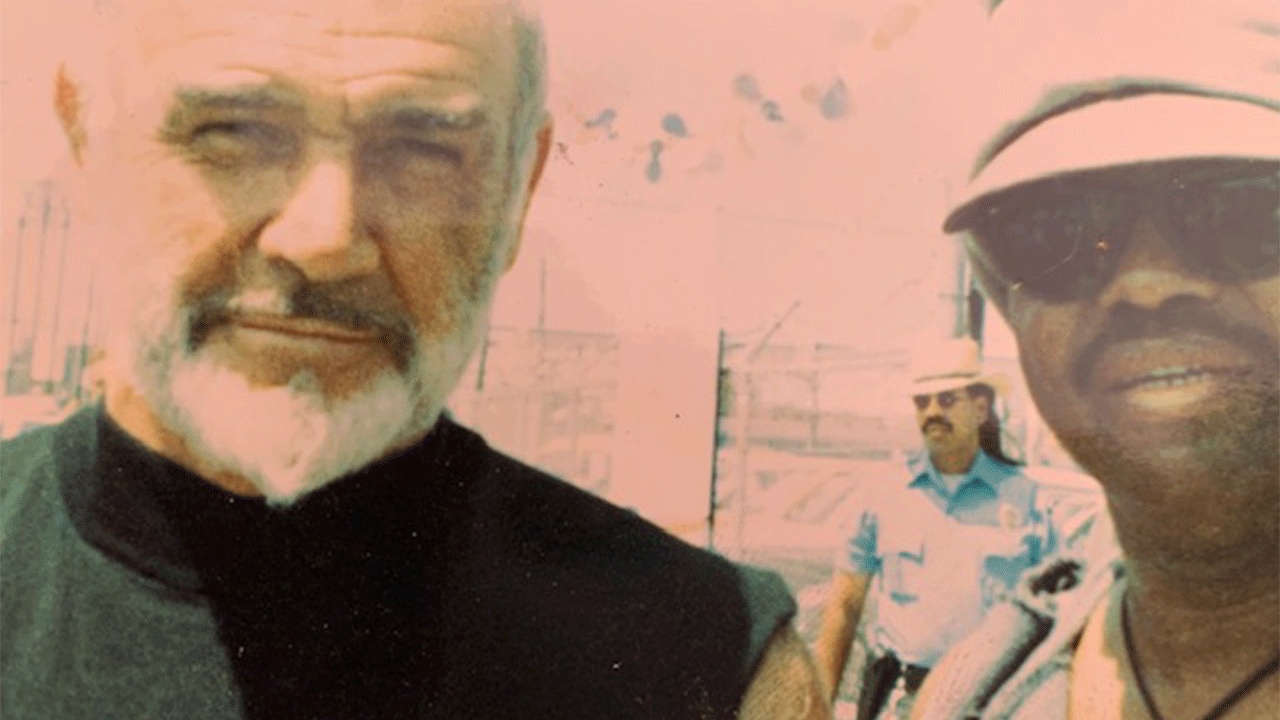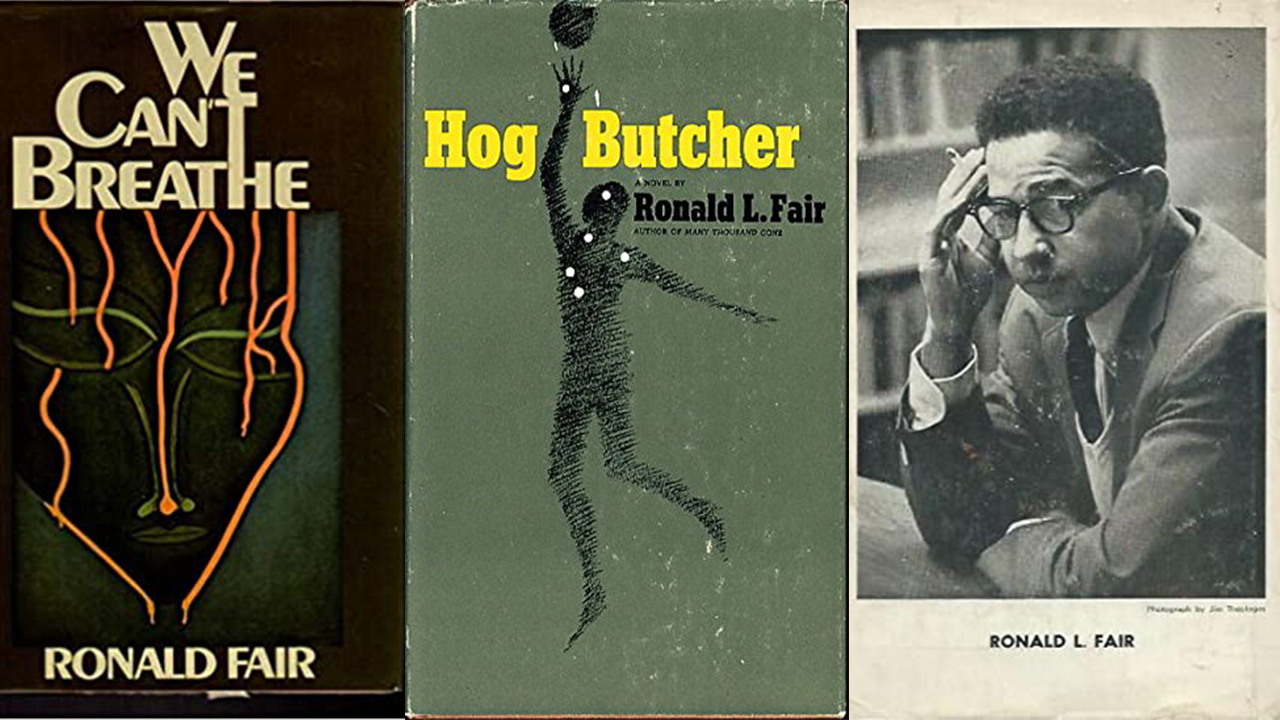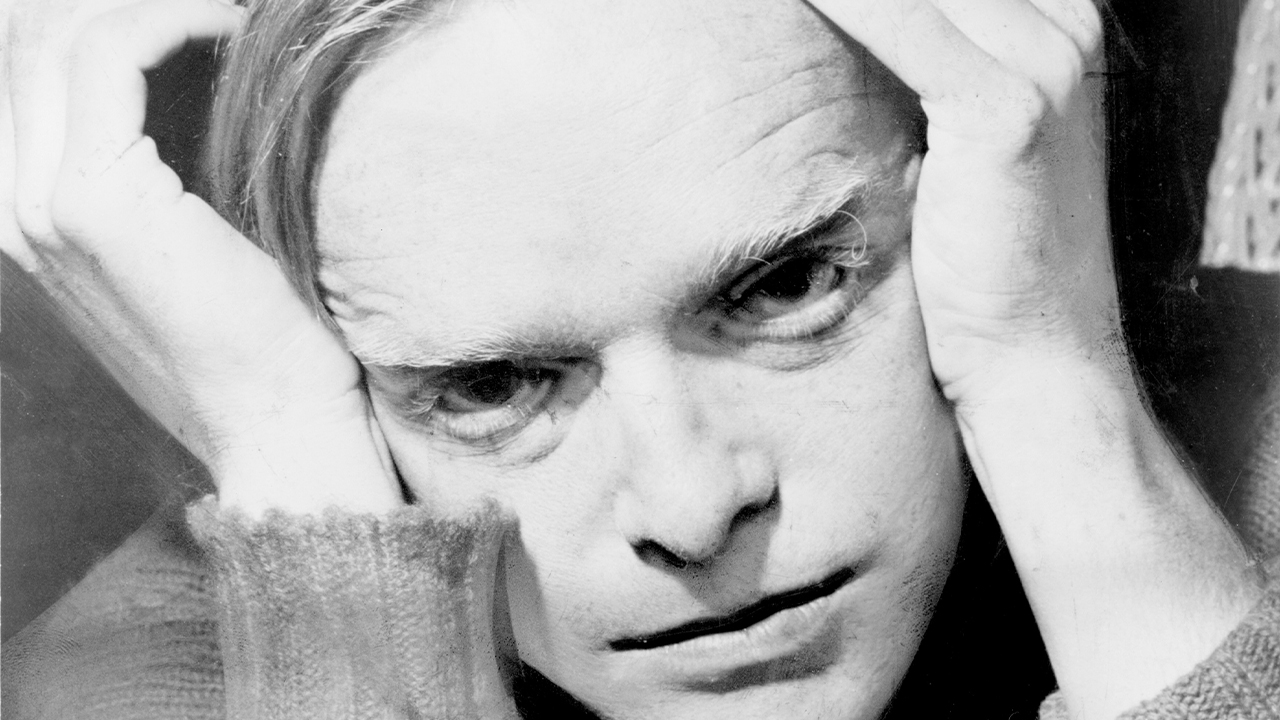With James Baldwin at the Welcome Table
A protégé of Baldwin remembers the writing of If Beale Street Could Talk
By Cecil Brown
September 23, 2019
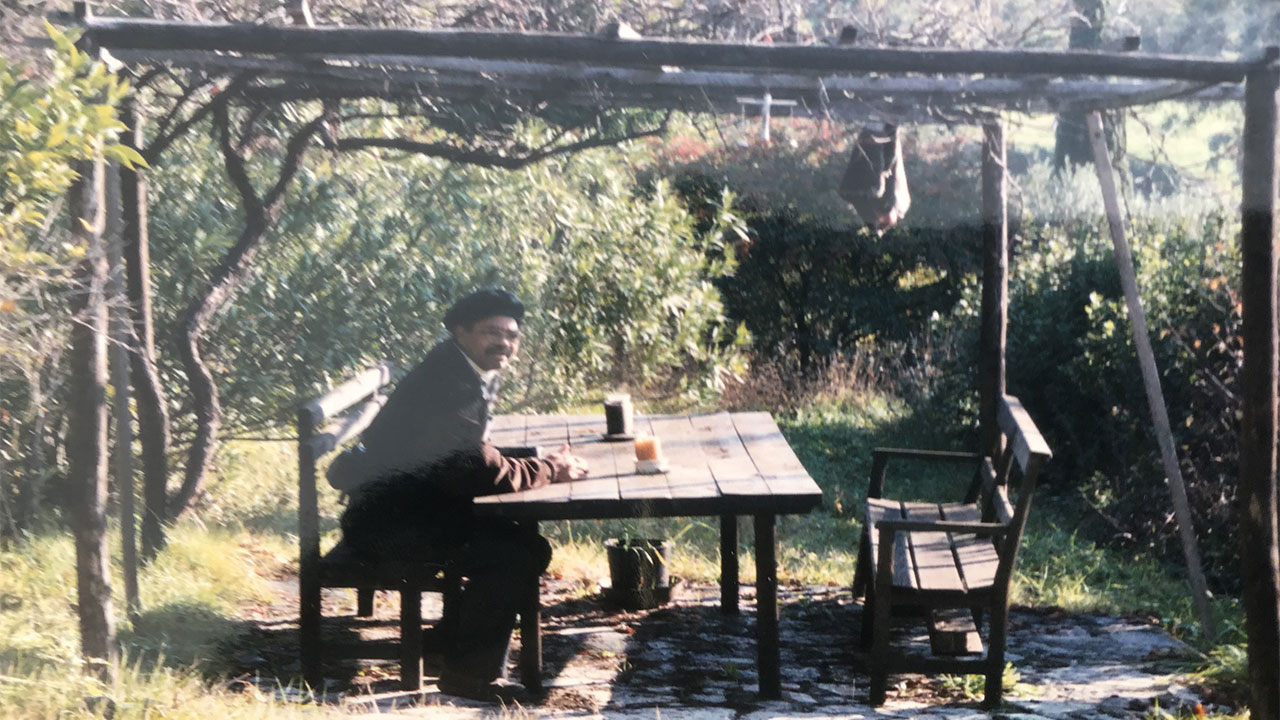
“If Beale Street could talk
If Beale Street could talk
Married men would
have to take their beds and walk”
—W.C. Handy, “Beale Street Blues”
“Cecil Brown was an American expatriate writer who remained close to Baldwin for several years. Baldwin was especially fond of Brown. He ended up showing him his old Parisian haunts, and he helped him meet people who could be of use to him—Carlos Fuentes, James and Gloria Jones, William Styron. At first he was simply grateful that Cecil seemed to like being with him. He had become so used to the crisis of the younger black writers that during his first meeting with Brown he said, ‘I thought you would hate me.’”
—David Leeming, James Baldwin: A Biography
I am sitting in the cushy seats in the Christopher B. Smith theater at the Mill Valley Film Festival waiting to see the film adaptation of James Baldwins’s If Beale Street Could Talk. (By “cushy” I mean that this theater has been restored classic art-decor that “takes you back to a time when going to the movies was an experience,” as one Jim. P describes his experience on Yelp.)
This is closing night and we are promised to meet the director of the film, Barry Jenkins, who won the Academy Award for Best Film in 2016 for Moonlight. Raoul Peck’s 2016 documentary, I Am Not Your Negro, is based on thirty pages of an unfinished manuscript that Baldwin called “Remember this house,” about the assassinations of Martin Luther King, Malcolm X, and Medgar Evers. These men were Baldwin’s friends, and their killings so deeply depressed him that he fled the United States. He went into exile in a small village in the south of France called Saint-Paul -de-Vence, became ill, and fell into a deeper depression. He could not write.
Today, we are obsessed by Republican President Donald Trump, but in the 1970s, we were obsessed by Republican President Richard Nixon. Baldwin associated the end of the civil rights movement and the assassinations of its leaders with Nixon and the rise of a white backlash. He saw Nixon as the epitome of all the evil things that had happened to black people during the sixties.
Occasionally, Baldwin would come up to Paris to do business and see old friends. I was in Paris then, and on one of these visits his agent, Tia French—the first African-American literary agent in France—set up a meeting. I had just published my first novel, entitled the very un-PC The Life and Loves of Mr. Jiveass Nigger, which was just then translated into French. Tia French had noticed the reviews in New York and had sent Baldwin’s secretary, Ray Frost, to meet me.
I met Baldwin in the hotel lobby of the Relais Besoin.
“I had to leave the States,” [Baldwin] told me when we went to dinner that evening. “To save myself. I finally had to leave for good. I loved Medgar. I loved Martin and Malcolm. We all worked together and kept the path together. I’m the last witness—everybody else is dead.”
“I thought you would hate me,” Baldwin said, shaking my hand —I was surprised to hear this, and I was not sure what he meant. I was not getting much love from the left-wing critics, and neither was he. The lily-white left thought that we were out of touch and other African-American writers railed against him, saying he was a sellout who wrote for white people. He was irritated and hurt by the anger and hatred. Eldridge Cleaver and Ishmael Reed ridiculed him as a “faggot—” and a “cocksucker—”
The Baldwin scholar Jules Farber summed it up: “Baldwin was targeted by the African-American community which asserted that he had taken a position as a self-glorifying ‘mouthpiece’ rather than as a witness.”
“I had to leave the States,” he told me when we went to dinner that evening. “To save myself. I finally had to leave for good. I loved Medgar. I loved Martin and Malcolm. We all worked together and kept the path together. I’m the last witness—everybody else is dead.”
Baldwin and I got along famously, and before long, he was telling me about his project, If Beale Street Could Talk. “Something new, and risky,” he explained. About then I learned that I had been turned down for a PEN fellowship. “Well, I ain’t got no fellowship for you, baby,” he said, “but if you make it down to my place in the south of France, I can give you a pork chop!”
I took the train to St. Paul de Vence. It was oppressively hot that summer in 1973. I arrived at Nice in the dark night. Baldwin met me in a Mercedes filled with his friends. They were on their way to a party. The party was a mix of white and black, but everybody seemed to like everybody else. I was a bit awed by Baldwin’s presence and the ease with which he conducted himself. They started to pass around a marijuana joint. Baldwin, while dancing to the loud music, handed me a joint.
“I’d like to read about this in your next novel!” he said.
At four in the morning, I woke to clanking of the electric Adler typewriter in his studio beneath my guest room. I looked out the small window into the distance. I could see a little village at the foot of the mountains. The villa was high on a hill with a sweeping view of the Mediterranean.
I went downstairs and sat down at an outdoor table. Baldwin called this the “welcoming table.”
• • •
Apparently, Jimmy had been given an advance of a hundred thousand dollars for If Beale Street Could Talk with the promise of another two hundred thousand on completion. I gathered that he was anxious to get it done. It seemed as if he needed the seclusion of this special place to write about the tragic life of black Americans.
Baldwin had a small staff consisting of five or six who ran “the spread”—as he called it—and kept him at work. Bernard Hassell—an African-American in his 30s, a former Folies Bergère dancer, who with a small staff ran the villa and took care of everything. Valérie Sordell, “la mama,” was the heart of the house. She arrived from the village on her Moby moped, wearing sunglasses Miles Davis had given her. She was a great cook. Her specialties were pot-a-feu and boeuf en daube. Dr. Bograd Boizard, the village doctor, was one of Jimmy’s drinking cronies. The mailman Bertrand Mazodier, age 17, delivered Baldwin’s mail because he “knew English.” David Baldwin, Jimmy’s younger brother, came over from Harlem when Jimmy needed his support. The writer David Leeming came in and out.
The party was a mix of white and black, but everybody seemed to like everybody else. I was a bit awed by Baldwin’s presence and the ease with which he conducted himself. They started to pass around a marijuana joint. Baldwin, while dancing to the loud music, handed me a joint. “I’d like to read about this in your next novel!” he said.
The rest of the seats at the Welcoming Table were generally filled with people at dinner time. Some were famous, some were not. Jazz trumpeter Miles Davis visited when he was playing in Nice or nearby. Writer Maya Angelou and singer Nina Simone came. Young artists who worked in the village would often show up for dinner.
Jimmy’s studio was on the bottom level of the main house. There he had a patio and private quarters. When you entered, you stepped onto a deep red carpet. You noticed the sweet smell of whiskey, cigarettes, and an open fireplace. To the right was his table and a big typewriter. The routine was fixed. No matter what else was going on, no matter who had come to visit, or how late Baldwin had been out, he was awakened at noon.
“Are you in this book, more or less?” a visiting reporter asked. “A writer is always more or less in his book,” Baldwin replied. “You try to keep yourself out, not to let your prejudices distort. In Beale Street, for instance, the girl is telling the story. You can say, I’m the girl or the boy or their unborn child.”
At two o’clock he would come to the welcoming table and greet whoever was there. He would read from a white unlined pad where he had been writing in longhand.
“What’s the story about,” I asked. “Where’s Beale Street?”
“It’s a street in Memphis that W. C. Handy wrote about,” Jimmy said. He had taken the title from a ballad by W. C. Handy, one that practically nobody remembers. Written in 1907, Ella Fitzgerald and Nat King Cole had recorded it. Baldwin wanted to refer to events in the mind of contemporary critics. If Beale Street Could Talk was Baldwin’s response to the Nixon threat. He could talk about language, street language, black English.
“Are you in this book, more or less?” a visiting reporter asked.
“A writer is always more or less in his book,” Baldwin replied. “You try to keep yourself out, not to let your prejudices distort. In Beale Street, for instance, the girl is telling the story. You can say, I’m the girl or the boy or their unborn child.”
“Is she talking in your language or in her own?”
“She’s a girl from the street, as I’m a boy from the street,” he answered.
Bernard Hassell came in to lay out the background to the novel, how much of it was based on Jimmy’s experience living in the Village and being in love with a black girl named Grace.
“He was in love,” Bernard said, speaking for Jimmy, who just sat and nodded. “She was the first girl he met. He wanted to marry her, but realized that he couldn’t support her.”
“The first black girl I met who dug me I fell in love with, lived with and also wanted to marry,” said Baldwin.
In the novel, the young black sculptor Fonny is in love with the beautiful Tish, just as Baldwin in real life was in love with Grace. But Fonny went to jail and Jimmy fled the country.
“What’s the story about?” I asked.
“Fonny has been imprisoned for a rape he didn’t commit,” Jimmy began. “He is in jail because of the animosity of a white policeman that has much to do with the sexual anxiety of white males in the presence of black males. The legal basis of his conviction is a contrived police lineup that plays directly into the white ‘all Negroes look alike’ attitude.’’
“Sure,” I agreed.
“While Fonny is in jail, Tish realizes that she is pregnant. Her family and Fonny’s father are supportive and work to try to raise bail to free Fonny.”
I realized that Tish’s family, the Rivers—as Jimmy read to us during those long summer afternoons—were the kind of people from my own North Carolina roots. These were the black folk who were sharecroppers and ex-slaves, run out of the South, even as Baldwin’s own father had been.
The Rivers and Fonny’s family, the Hunts, were on opposite sides of the black community. The Rivers were blacks among blacks, who saw black salvation as coming from a sense of black community. They were angry and determined, tough-talking people who through their love for one another could overcome the white man’s oppression. The Hunts, by contrast, were wound tight, who got along with white people, because they were the kind of people who went along with white people.
Baldwin’s breakthrough in Beale Street was to give up language directed to white readers and to record how black people used English, how they actually talk to each other. He read a scene to us in black English, Fonny’s description of his father and mother making love:
… I used to hear them. She’d come home from church, wringing wet and funky. She’d act like she was so tired she could hardly move and she just fall across the bed with her clothes on … And he’d say, The Lord’s going to help you. She’d start to crying and calling on Jesus while he started taking all her clothes off—I could hear them kind of rustling and whistling and tearing and falling to the floor … —and when he got her naked and got on top of her she was still crying, Jesus! help me, Lord! my Daddy would say, You got the Lord now, right here. Where you want your blessing? … here? here? … And she say Oh, Lord, help me to bear my burden. And he’d say, Here it is, baby … You got a friend in Jesus and I’m going to tell you when he comes. The first time. We don’t know about the second coming. Yet.
And then the bed would shake and she would moan and moan and moan … I’ll always remember Fonny’s face when he talked about his Daddy.
Raunchy, but this was the way black people talked to each other. Even the mailboy, Bertrand Mazodier, sipping on his second glass of wine, enjoyed it.
This was the truth about the way black people talked. Jimmy wanted to return the African-American language to the natural speech of the oral poets, like the slave poet George Moses Horton (1797-1883). For decades, literature by black authors suffered from sounding white. In the end, Jimmy decided that black writers had to take over the English language and make it our own—that we had to make the language express black identity and black experience.
“The story has to be told from the point of the pregnant girl,” Jimmy said. “I don’t know how to tell it otherwise.”
How else could he show the emotional vulnerability of black people? In this novel, he would show the relationship that the black characters had to each other. The language they use was the way they talked to each other—the way they thought about each other and about themselves.
It was important that he made Fonny an artist.
“But I don’t like the word ‘artist,’ ” Jimmy said one day after talking about Fonny. “I prefer the term ‘poet.’ A poet is energy, a recreation of experience. Poetry gives back to you.”
“Like what poets exactly?” I asked.
“I mean like Nina Simone. Her words are poetry. She gives you back your experience. That’s what a poet does. I’m not talking about books. I’m taking about a certain kind of passion. The role of the poet is the same as the role of the lover. If you love somebody, you try to correct them … and by you trying to correct them, the person who you love goes to help you. Love is a two-way street. If I love you, I try to make you conscious of the things you don’t see. The people and the poet can’t do without each other. The poet knows it before the people. The people don’t know it sometimes, until the poet is dead. But it doesn’t matter, the main idea is to change the world.”
For decades, literature by black authors suffered from sounding white. In the end, Jimmy decided that black writers had to take over the English language and make it our own—that we had to make the language express black identity and black experience.
Love was a collaborative work of art, Jimmy said, and that was why he made Fonny an artist, and that was why Tish was having a baby. Each of the lovers is learning to collaborate with the other. Just as the work of art needs patience, so did the lovers who teach each other.
“It’s about the baby,” he said, “they must take care of the baby.” The baby was the future not only because it perpetuates the race, but because it is the best protector of the heritage of black people. Without the preservation of our heritage, of how we live, and the morals and values we uphold, we are doomed.
Sometimes I drove Jimmy around the back roads in southern France. He would sit in the back, his flowing scarf tied around his neck. We had wonderful conversations—about black literature, French literature, Russian literature. Our favorite topics revolved around the novels that Richard Wright published after he died: Lawd Today!, and the non-fiction work American Hunger. We would go through the stories by Ralph Ellison, too: “King of the Bingo Game” and an extract from Cadillac Flambé. Jimmy talked about making his new novel into a film. The narration should be voice-overs that would show Tish’s “central consciousness.”
I suddenly realized that I had been having such a good time in the south of France with Jimmy Baldwin that I had forgotten to write my girlfriend. I had not gotten her mail, either, which had not been forwarded down from Paris. Fearing that our relationship was over, I sat down on the bed. Seeing me bent over and no doubt with a pained expression, Jimmy put his arm around me, and asked, “Is this the first time your heart’s been broken, baby?” I felt then like Jimmy was my father and I his son.
I flew back to Paris and gathered the gloomy news from my girlfriend’s letters. A few weeks later, Jimmy arrived in Paris. He had finished the manuscript to If Beale Street Could Talk. We met for lunch at the Deux Magots. I looked at the menu and called the waiter over and asked for an English translation.
Jimmy interrupted. He said, “It’s pork chops, baby!”
We both laughed.
A month ago, some forty years later, I read Philippe Bébon, Baldwin’s personal secretary, quoted in Jules Faber’s book Escape From America: “Cecil Brown, who arrived regularly in the early ’70s became one of Jimmy’s closest friend among the younger black male writers.” Jules Faber writes that he found Philippe Bébon living in a hamlet high in the French mountains with an unlisted phone.
I remembered Philippe and always thought of him with respect. I wondered if after forty years I could somehow talk to him, to reminisce about those days back then. I got in touch with Jules Faber and he gave me Philippe’s telephone number in the French Alps.
The phone rang. I said, Hello. He said, Hello. I explained who I was but almost immediately I heard Bébon laugh with recognition. As he laughed, I remembered him as he was forty years ago, sitting at the Welcome Table with Jimmy Baldwin.
I told him there was a film being made of If Beale Street Could Talk.
“Yes, yes,” he says.
“When did you first work on If Beale Street Could Talk?” I asked.
“I came to work with Jimmy in November, 1972. Jimmy had been working on the book for about three years then.”
“Who did he read it to?”
“To you, to me, to Bernard, and to his brother David.”
I remembered David Baldwin. He came every year. Jimmy would read to him every day. Once Jimmy said to me, leaning across the Welcome Table in a friendly way, “You know I read to my brother David all right. He couldn’t actually help me. But he did something important. He reacted. He really reacted to the story in a way that told me something. It was his laughter that lead me to discover something in the people in the story.”
“Yes, of course,” Phippe Bébon said, “the routine when I was in the house was that I woke him around noon. He would read the English and French newspapers and then have lunch around 2 pm. At the table there could be numerous guests. Simone Signoret once popped in for a meal. I still remember a crude Harry Belafonte, and the handsome Bill Cosby. Nina Simone was always in the house when she had a singing engagement in the region or just wanted a break.”
Once Jimmy said to me, leaning across the Welcome Table in a friendly way, “You know I read to my brother David all right. He couldn’t actually help me. But he did something important. He reacted. He really reacted to the story in a way that told me something. It was his laughter that lead me to discover something in the people in the story.”
“What other activities do you remember from those days?” I asked Philippe.
“We had a chauffeur. Jimmy couldn’t drive. There was Ray. There was a housekeeper, a German lady named Heidi Widenfields, a tall blonde married to a Swede.”
“Do you remember Jimmy working?”
“I remember that Jimmy wrote with his left hand and on long, white unlined pads. Always by hand.”
I asked Philippe if he ever went back to have a look at the old house.
“The house is a disaster! I live only sixty miles away, but I never go there now. I saw it at the beginning but it was too sad to watch it go down.”
He laughed, remembering forty-four years ago.
“What do you do now, Philippe?”
“Well, I’m nearly eighty. I just take care of my garden. That’s about it. I love my garden.”
I thanked Bébon.
• • •
Beale Street made it to the bestsellers list and stayed on for seven weeks, or maybe it was ten. Reviews were good. Joyce Carol Oates on the front page of the New York Times Book Review called the novel “timeless” and “economically, almost poetically constructed.” She said it was like a parable and suggested that “it may be read as a kind of allegory that stresses the provisional, tentative nature of our lives.” She admired Baldwin’s treatment of narration through Tish’s “absolutely natural voice.”
Finally, in Mill Valley, the film begins and the lights go dark. We see a black screen and then the text scrawls across the screen:
“Every black person born in America was born on Beale Street, born in the black neighborhood in some American city, whether it is in Jackson, Mississippi, or in Harlem, New York City. Beale Street is our legacy,”
—The first scene is an aerial shot of a young black couple, Tish and Fonny.
A medium shot and then she says:
“Are you ready for this?”
“I never been more ready for anything in my life,” he answers.
The first dramatic scene between Tish and Fonny is in the visiting room of the Attica Prison. Tish tells Fonny she is pregnant and he is going to be a father. That is how the novel begins, in the consciousness of his main character Tish, dominating the world we share with her. The director uses the camera and voice-over as ways to make her consciousness accessible, visually and audibly.
The plot moves easily and gracefully. We listen to Tish’s monologues and we follow her thoughts. We see the other characters through her consciousness and perception, just as Baldwin had done in the novel. Tish must tell her father that she is pregnant. The father enters the house. The mother brings out the scotch. The camera comes down on Tish. She begins, but the scene cuts to Fonny’s family.
Fonny’s mother is religious, believing that her son has been corrupted by Tish’s sexual profligacy. She curses the unborn child. “Y’all bringin’ a bastard into this world!” she screams. The husband stands up and smacks her across the face.
“This scene,” the director Barry Jenkins told the Los Angeles Times, “was the blackest scene in the movie.” He added that “blacks speak in this way when they are amongst themselves … When people walk into the theater, they are going to be allowed into James Baldwin’s mind. They will experience what it is like to be black in America.”
Jenkins makes the minor characters come alive, reflecting the power of Baldwin’s writing. For example, when the policeman, Bell, harasses Tish and Fonny, they are defended by an immigrant lady. This actress only has a few lines but you see her point of view. The Jewish landlord, who rents them the loft, smiles with heartfelt sympathy: when people are in love, he is moved. I smiled through the whole film. Barry Jenkins has realized Jimmy’s dream of what the film would be like if Baldwin himself had made it.
“Good evening, ladies and gentlemen,” Mark Fishkin, festival director, said coming out onto the stage after the film had ended. “We have here the director and the leading actor of the film.”
Barry Jenkins is a dark black man who with his dark-rimmed glasses and close-cut hair, makes a nerdy impression. The skinny-legged trousers expose his feet without socks. He sits next to Tiki, the actress who played Tish. She is a very tall woman, over six feet, and wears a white flowing gown, looking much older than the 19-year-old character she portrayed.
Barry Jenkins got up and went to the podium. He started by saying that there was a deliberate connection between Moonlight and Beale Street.
“In both of them I tried to talk about one theme. That theme is ‘black love, black family.’ Moonlight … is how I grew up, and Beale Street is the family I wish I had. With Beale Street I wanted it to be as faithful to the Baldwin text as possible,” Jenkins said. “This is the first English adaption in the English language. I wanted the film to be more about Baldwin than about me.”
“James Baldwin lived outside of America,” an audience member said, standing up. “Did it help him see the race problem in America—or was he too out of touch?”
“Living in America Baldwin felt suffocated. He felt the dangerous ways and he went out. He came back and forth, but he went to France.”
“Was there anything you didn’t put in the film that was in the novel?” asked another attendee.
“The book is wild—some wild stuff we couldn’t put in the film, like a sex scene between Fonny’s father and his religious wife. There’s a lot of stuff that’s set in the past, but we had to cut most of that. As it is, the film is almost two hours long.”
He told the audience that before he began shooting the film, he received an unexpected package from Gloria Karefa-Smart, James Baldwin’s sister and the executor of his estate. It contained a brown leather-bound notebook dated 1978. In it were Baldwin’s ideas about how to approach a film adaptation of the novel, some of which Jenkins used.
How did Jenkins hear about the novel? Had he heard about the novel before he accepted it as a project?
“I considered myself a Baldwin fan,” Jenkins said. “I had read Giovanni’s Room and The Fire Next Time. A friend of mine—a sound editor—gave me this book and said it would make a great movie. Get this all the time, but since it was Baldwin, I read it right away. Then I began writing it as I was finishing Moonlight.”
“What was your purpose in making the film?”
He said he hoped to inspire other film-goers to go out and buy James Baldwin’s books.
“When Baldwin wrote the novel, the world was very different. For example, a lot of my friends don’t read. But I hope that after seeing this film my friends will say, ‘That’s a dope filmmaker, but where can I read more James Baldwin?’ ”
“How did you use the music in the film to create the characters?”
“Baldwin wrote a lot of music into the text,” he said, “but a lot of it was too expensive. But the ones we did get were cohesive to the scenes we chose. For example, when the men are eating, we have Al Green’s ‘For the Good Times,’ and they are listening to blues by Miles Davis.”
There came a question from a young black man, one of the few blacks in the large auditorium:
“How do you balance the role between being a filmmaker and being a black filmmaker?”
“I do what filmmakers do, I make films,” he said, “but if I were a cabinet-maker or a cellist, I would be a black cabinet-maker and a black cellist. If I walk into a room, any room, there might be two percent who will know that I have an Academy Award, but everybody in the room will know that I am a black man who just walked into a room. Their knowing I am a black man brings a lot of baggage. I just make the kind of films that I like. I just make the shit I like, but it’s black as hell!”
“Wow, Berlin,” [Jenkins] said. “I wrote the whole script to Beale Street in Berlin! I told my agent I want to go somewhere I don’t know anybody and she picked Berlin!”
“Exactly!” I said. “Like Jimmy, you need distance from the material.”
We walked up Third Street to the Elk’s Club in San Rafael where the Mill Vally Film Festival closing party was being held. You enter the courtyard. There is a sign that points to the left for Celebrity Party and to the right for the Food Party. I find Barry Jenkins under a flood of lights and against a white wall. He is holding his Oscar and posing with a pretty white girl.
He acknowledged me.
“Hey, man, I loved your film and Jimmy would have loved it, too,” I told him.
“Thanks, that’s why I made it. For Jimmy!”
“Why did you change the ending?” I asked him.
He paused. “Yeah, well,” he laughed, “yeah you noticed that! We did shoot it the way that Jimmy wrote it. But when we showed it to an audience they thought that Fonny had committed suicide. So we reshot it so that the son is about five years old and Fonny is still in jail.”
“Fonny is still in jail?”
“Right!”
“Well, that was how Jimmy wanted it. He always said that, back in 1974, that he wanted the novel to end with Fonny still in jail.”
I handed him a couple of my books I brought to give him. As I scribbled a dedication to him, I thanked him for a film so much like what Baldwin imagined it to be. Then I handed him my new book. I Still Have a Bag in Berlin.
“Wow, Berlin,” he said. “I wrote the whole script to Beale Street in Berlin! I told my agent I want to go somewhere I don’t know anybody and she picked Berlin!”
“Exactly!” I said. “Like Jimmy, you need distance from the material.”
“Jimmy believed that the artist was a lover. Do you see it like that?”
“Yes, that is what Fonny says. This is my chisel! I love this more than anything and it keeps me alive.”
“The chisel is a metaphor for writing,” I said. “For you it is a metaphor for filmmaking.”
“There were moments,” Barry told me with a sly grin, “when Baldwin would just appear on the set. He would sort of waltz in and take over. There are two, three shots in the end when this happened.”
“I get it,” I said. “You have become Jimmy!”
He laughed.
I reached out for Jenkins, but he was gone. He was swallowed up by a sudden posse of admirers from the party.
Baldwin returned to New York in 1974 to celebrate the publication of Beale Street. The nation was in turmoil. Nixon was finally on his way out. Still, Baldwin gave a sermon at St John the Divine Cathedral in New York that referred to Richard Nixon as a motherfucker.
“No one has ever before said ‘motherfucker’ in the pulpit at this church,” the old dean said to the new dean. He is reported to have replied, “It’s about time somebody did.”
